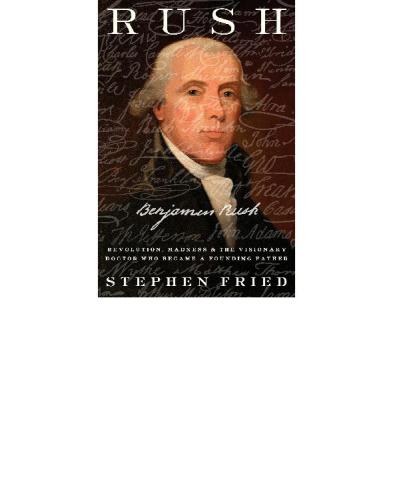
Rush
Revolution, Madness, and Benjamin Rush, the Visionary Doctor Who Became a Founding Father
انقلاب، دیوانگی، و بنژامن راش، دکتر بلندپروازی که به صورت یک پدر متفکر درآمد،
کتاب های مرتبط
- اطلاعات
- نقد و بررسی
- دیدگاه کاربران
نقد و بررسی

July 15, 2018
A welcome biography of a Founding Father who, for many reasons, has been eclipsed by other figures of the Revolution.Benjamin Rush (1745-1843) is renowned in the annals of American medicine as a pioneer of medical education and the treatment of the mentally ill. Yet, writes Fried (Appetite for America: How Visionary Businessman Fred Harvey Built a Railroad Hospitality Empire that Civilized the Wild West, 2010, etc.), Rush came to medicine somewhat late, having rejected a career in the clergy and then the law, and he settled in to a kind of general practice that was notable for lifestyle advice: "Every full meal," he warned, "is a stimulous to the whole system, and brings on a temporary fever." Well ahead of contemporaries and later generations of professionals, he advocated a nice round of golf, a game that he claimed would allow its player to "live ten years the longer." Falling into the orbit of freethinkers such as Benjamin Franklin and John Adams, the latter of whom thought him "too much of a talker to be a deep thinker," Rush became a prominent revolutionary and signer of the Declaration of Independence, then surgeon general of the Continental Army. In the last post, he advocated for better conditions for the soldiers, a losing argument in "an army that still didn't have enough uniforms, shoes, or proper weapons." Fried's account of Rush's postwar career is full of oddments: A slaveholder, Rush eventually became a vocal abolitionist and supporter of African-American causes; an early advocate of mental health treatments, some of which we would regard as quackery today, he had some odd notions--e.g., the thought that booksellers, moving from one book and one subject to another so rapidly, "have sometimes become deranged from this cause." In all, Fried delivers a complete portrait of a complex man too little known outside Philadelphia.A careful account of a man who excited attention and controversy in his day but then fell into the shadows. Fried does well to restore him to history.
COPYRIGHT(2018) Kirkus Reviews, ALL RIGHTS RESERVED.

Starred review from July 30, 2018
Fried (Appetite for America) makes the case, in this comprehensive and fascinating biography, that renaissance man Benjamin Rush merits more attention. Rush served the American Revolution “as a doctor, a politician, a social reformer, an educational visionary, and even as an activist editor”— and persuaded Thomas Paine to write Common Sense. He put his life on the line as a battlefield surgeon; wrote a “pamphlet that would transform military medicine in America”; served as a public health advocate and champion of public education for all, including women, African-Americans, and immigrants; and supported abolition and the separation of church and state. He was credited by John Adams as having made more contributions to independence from Britain than Ben Franklin. Despite all this, Fried portrays Rush as a complex, flawed person and not just a list of accomplishments; he describes the doctor’s ill-advised and indiscreet criticisms of the leadership of the Continental Army in 1778, conveyed in a letter to his wife that discussed the possibility of ousting Washington as its commander—a primary source that Fried and his researchers believe had never been transcribed before. That find is a testament to the authorial thoroughness and insight that will keep readers engaged until the last page.

September 15, 2018
Fried (journalism, Columbia Univ. Graduate Sch. of Journalism; Univ. of Pennsylvania) endeavors to resurrect a forgotten Founding Father in this biography of Benjamin Rush (1745-1813), the most renowned physician of his time, whose life and career spanned three critical periods of America's beginnings: Colonial, Revolutionary, and Early Republic. Educated at Edinburgh University's world-renowned medical school, Rush became known as the "American Hippocrates." Like Thomas Jefferson and Benjamin Franklin, whom he counted as intimate friends, Rush exemplified the enlightenment spirit. His curiosity extended beyond medicine into politics, mental health, and public education, and like other enlightenment intellectuals, he put his knowledge into action. Because of his persuasiveness, John Witherspoon left Scotland to accept the presidency of Princeton University. As a Pennsylvania delegate to Congress, Rush signed the Declaration of Independence and later became George Washington's surgeon general during the Revolutionary War. A vociferous opponent of slavery and capital punishment, Rush facilitated the rapprochement between John Adams and Jefferson in their final years. VERDICT Based extensively on Rush's personal papers and writings, Fried's study succeeds in making a dynamic patriot accessible yet falls short in immersing our imagination in Rush's world.--Glen Edward Taul, formerly with Campbellsville Univ., KY
Copyright 2018 Library Journal, LLC Used with permission.

September 1, 2018
Best-selling, award-winning journalist and author Fried (Appetite for America, 2010) illuminates the importance of a lesser-known Founding Father, drawing on previously unpublished primary sources. Young doctor Benjamin Rush bravely signed the Declaration of Independence yet hesitated to get directly involved in politics afterwards, choosing instead his own progressive missions. He was George Washington's surgeon general, had good relationships with John Adams and Thomas Jefferson, and found a mentor in Benjamin Franklin. Fried reveals Rush's groundbreaking accomplishments as a lifelong advocate of patients' medical rights and the advancement of medicine. Rush often spoke in favor of and worked hard to achieve better medical treatment and sanitation for American soldiers and improved living conditions for those with mental illnesses. He fought against the yellow fever epidemic in Philadelphia in 1793, though his methods of treatment were controversial. Valiant, compassionate, and determined, Rush was a vocal opponent of slavery and actively supported African American rights. Fried's reclamation of this important, overlooked American founder is an invaluable addition to American history collections and a solid recommendation to biography fans.(Reprinted with permission of Booklist, copyright 2018, American Library Association.)

























دیدگاه کاربران